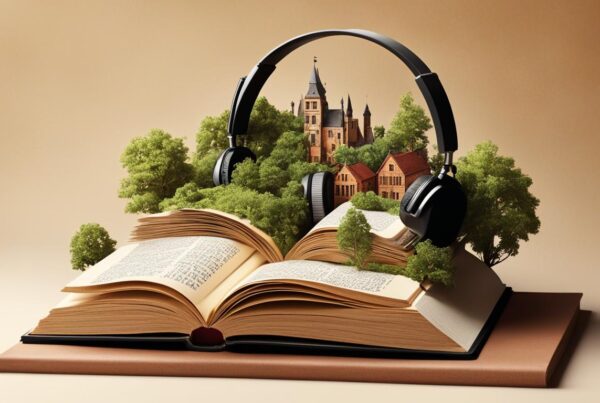Welcome to our audiobook review of “The Book Thief” by Markus Zusak. As one of the most popular novels of the past decade, “The Book Thief” has captured the hearts and minds of readers around the world. In this review, we will delve into the experience of listening to the audiobook, analyzing the narration, voice acting, pacing, emotional impact, literary analysis, and more. Whether you are a fan of Markus Zusak’s writing or simply looking for a captivating audiobook, we have got you covered. So, let’s dive in!
About the Author, Markus Zusak
Markus Zusak, born in 1975 in Sydney, Australia, is a celebrated author best known for his captivating storytelling and creative writing style. Zusak has authored six books since 1999, including The Book Thief, which catapulted him to international fame.
Zusak’s books have been translated into more than forty languages and have accumulated numerous awards, including the 2006 Michael L. Printz Honor, the 2007 Deutscher Jugendliteraturpreis, and the 2014 Margaret A. Edwards Award.
Zusak’s writing is characterized by his use of vivid imagery, metaphors and engaging narratives that provoke empathy from readers. His ability to create nuanced and layered characters has made his work widely popular across different age groups and cultures.
Synopsis of “The Book Thief”
Set in Nazi Germany, “The Book Thief” by Markus Zusak follows the story of a young girl named Liesel Meminger, who is sent to live with foster parents in a small town outside of Munich. Despite her struggles with reading, Liesel becomes enamored with books, stealing them whenever she can. Her love of literature leads her on a dangerous path, as she begins to collect forbidden books and share them with her family and friends.
As the war intensifies, Liesel and her family are forced to confront the harsh realities of life under Nazi rule, including discrimination, censorship, and violence. Through her experiences, Liesel learns the power of language and the importance of standing up for what is right, even in the face of danger.
The Book Thief is a poignant tale of hope and resilience, exploring themes of loss, grief, and the human spirit.
The Audiobook Experience
Listening to “The Book Thief” audiobook provides a unique and immersive experience that enhances the storytelling beyond the traditional print version. The narration quality is exceptional, with the voice actor skillfully conveying the emotions and personalities of the characters.
The impact of auditory storytelling is particularly evident in Markus Zusak’s descriptive and evocative writing style. The sound effects and music also contribute to the overall listening experience, adding depth and atmosphere to the narrative.
The audiobook experience elevates the emotional impact of the story, allowing listeners to empathize with the characters on a deeper level. Some may argue that the audiobook version can feel slower paced than the print version, making it necessary to pay closer attention to appreciate its nuances.
Overall, “The Book Thief” audiobook provides a captivating and engaging experience that enhances the story’s themes and message, making it a highly recommended listen for any book lover.
Narration and Voice Acting
One of the most significant aspects of any audiobook is the narration quality and voice acting, as they can make or break the overall listening experience. In the case of “The Book Thief” audiobook, listeners are treated to an exceptional performance that truly brings the story to life.
The narration, done by Allan Corduner, is consistently engaging and emotive, capturing the essence of the book’s narrative style and tone. Corduner’s crisp enunciation and measured pacing make it easy to follow the story, while his ability to convey the various characters’ emotions and personalities through his voice adds an extra layer of depth and richness to the listening experience.
Similarly, the voice acting in “The Book Thief” is top-notch, with each character portrayed with nuance and authenticity. Notably, Sophie Nélisse’s portrayal of the young protagonist, Liesel, is remarkably compelling, capturing both her strength and vulnerability in a poignant and relatable way.
Overall, the narration and voice acting in “The Book Thief” audiobook is nothing short of outstanding, adding an extra layer of immersion and emotional impact to an already deeply affecting and memorable story.
Pacing and Flow
One of the most crucial aspects of any audiobook is its pacing and flow. If the narration is too slow or fast, it can hinder the listener’s comprehension and overall enjoyment. On the other hand, a steady rhythm and well-timed pauses can create suspense, convey emotions, and keep the listener engaged.
Fortunately, “The Book Thief” audiobook delivers a perfectly paced and fluid narration that captures the essence of Markus Zusak’s writing style. The subtle inflections and intonations of Allan Corduner, the narrator, add depth and resonance to the characters’ voices and emotions, making it easy to follow the story and empathize with the characters.
In particular, the audiobook’s pacing is spot on, with a gradual build-up of tension and emotions as the story progresses. The pauses between each chapter allow the listener to reflect on the events and anticipate the next chapter, without disrupting the flow of the story. The audiobook also features a musical interlude between certain sections, adding a nice touch of ambiance and immersion.
Overall, the pacing and flow of “The Book Thief” audiobook is outstanding, providing an optimal listening experience that is both enjoyable and engaging.
Emotional Impact

The audiobook version of “The Book Thief” delivers a powerful emotional impact, evoking a range of feelings from joy to sadness, empathy to suspense. The book’s themes of love, loss, and hope are expertly conveyed through the narration and voice acting, providing listeners with a deeply moving experience.
The story of Liesel Meminger, a young girl growing up in Nazi Germany, is heartbreaking and poignant, and the audiobook does justice to the power of Zusak’s writing. Listeners become fully immersed in the story, feeling the weight of each emotion and gripped by the suspense of each moment. The voice actors bring the characters to life, making them feel vivid and real.
Perhaps the most impactful feature of “The Book Thief” audiobook is the way it encourages listeners to connect with their own emotions. The story of Liesel and her loved ones is tragic, but it is also a testament to the resilience of the human spirit. By experiencing the highs and lows of this story, listeners are inspired to examine their own lives and the way they navigate difficult situations.
All in all, “The Book Thief” is a remarkable audiobook that leaves a lasting emotional impact on its listeners. It is a testament to the power of storytelling and the ability of literature to touch the human heart.
Literary Analysis and Writing Style
Markus Zusak’s writing style in “The Book Thief” is unique and effective in conveying the emotional depth of the story. The novel makes use of literary devices such as symbolism, foreshadowing, and metaphors to create a poignant and immersive experience for the reader.
The use of Death as the narrator is particularly interesting, as it gives the reader a different perspective on the events that occur in the story. The writing style allows for a level of intimacy with the characters that is rare in literature, making them feel like real people with distinct personalities and motivations.
The themes of the novel, such as the power of words and the importance of humanity in times of war, are explored through the characters and their experiences. Zusak’s writing style effectively conveys the complexity of these themes, leaving a lasting impact on the reader.
The Use of Symbolism
One of the most notable literary devices used in “The Book Thief” is symbolism. Zusak uses objects such as books, colors, and even the weather, to represent larger ideas and themes in the story.
| Symbol | Meaning |
|---|---|
| Books | The power of words and the ability to create and destroy through language. |
| Colors | The difference between life and death, hope and despair, innocence and guilt. |
| Weather | The unpredictability and violence of war, and its impact on nature and humanity. |
The symbolism in the novel adds depth and complexity to the story, allowing readers to interpret the themes in their own unique way.
Character Development
Zusak’s writing style is also notable for its focus on character development. Throughout the novel, the characters go through a range of emotions and experiences, each one contributing to their growth and transformation.
One particularly effective example of character development is Liesel’s journey from illiterate refugee to book thief to storyteller. Zusak’s writing style effectively captures the nuances of her character and her emotional journey, making her a relatable and dynamic protagonist.
Overall, Markus Zusak’s writing style in “The Book Thief” is a masterful example of literary fiction, utilizing various devices and techniques to create a moving and impactful story.
Comparison with the Print Version
Listening to an audiobook can provide a unique and immersive experience, but how does it compare to reading the print version of a book like “The Book Thief?”
One major difference is in the level of immersion. While audiobooks offer the advantage of being able to listen to the story while doing other activities, such as driving or exercising, the experience may not be as immersive as reading a physical book. With a print version, readers have the ability to physically interact with the book, turning pages, underlining passages, and engaging with the text in a more tangible way.
Interpretation of certain elements, such as tone and pacing, may also differ between the two versions. While audiobooks rely on voice acting and narration to convey the story, the reader’s interpretation of the text may differ, as they imagine the character’s voices and the pace at which events unfold.
Overall enjoyment may also vary between the two versions. Some readers may prefer the convenience and ease of audiobooks, while others may find more satisfaction in the traditional experience of reading a print book.
Criticisms and Limitations

While “The Book Thief” audiobook has received critical acclaim, it is not without its criticisms and limitations. One potential drawback is the pacing of the narration, which some listeners may find slow or meandering. Additionally, there have been complaints about unclear audio quality in certain sections of the audiobook, leading to difficulty understanding the dialogue.
Furthermore, for listeners who are not familiar with German accents, the voice acting may pose a challenge, as many of the characters in “The Book Thief” have German accents. This could make it difficult to discern certain words or phrases, which could detract from the overall listening experience.
Despite these criticisms and limitations, “The Book Thief” audiobook remains a highly recommended listening experience for those who enjoy a thought-provoking and emotionally impactful story. With its rich characters, vivid setting, and unique narrative perspective, it is sure to resonate with listeners for years to come.
Audience Reception
The audiobook version of “The Book Thief” has received overwhelmingly positive feedback from audiences. According to reviews on Goodreads, the audiobook has an average rating of 4.5 stars out of 5, based on over 140,000 ratings. Listeners have praised the narration quality and emotional impact of the audiobook, with many noting that the story is particularly moving when heard aloud.
On Audible, the audiobook has similarly high ratings, with an average of 4.8 stars out of 5 based on over 170,000 ratings. Listeners have commented on the excellent voice acting and the ability of the narrators to bring the characters to life. Some reviewers have also noted that listening to the audiobook enhances their understanding of the story and its themes.
Overall, the audience reception of “The Book Thief” audiobook is overwhelmingly positive, with many listeners recommending it to others and praising its impact.
Impact and Enduring Legacy
The audiobook version of “The Book Thief” by Markus Zusak has had a profound impact on the audiobook industry, paving the way for other notable works to be adapted into the format. The captivating narration and remarkable voice acting, combined with Zusak’s evocative writing style, have made it a beloved choice for listeners around the world.
Furthermore, “The Book Thief” has left an enduring legacy in popular culture, inspiring a film adaptation and a stage play. It has also been translated into over 40 languages and has won numerous awards, including the Michael L. Printz Honor and the Commonwealth Writers’ Prize.
The powerful storytelling, emotional impact, and lasting cultural relevance of “The Book Thief” make it a standout in the audiobook genre and a must-listen for anyone who appreciates powerful and thought-provoking storytelling.
Conclusion
Overall, “The Book Thief” by Markus Zusak is a captivating and emotional audiobook that offers a unique listening experience. The narration and voice acting are top-notch, effectively conveying the various emotions throughout the story. The pacing and flow of the audiobook keep the listener engaged, and the literary analysis and writing style are impressive and thought-provoking.
While some listeners may find the audio quality or accents challenging at times, the enduring impact and cultural significance of “The Book Thief” make it a must-listen for fans of audiobooks and literature alike. Therefore, we highly recommend this audiobook to anyone looking for a powerful and moving story that will stay with them long after the final chapter.



